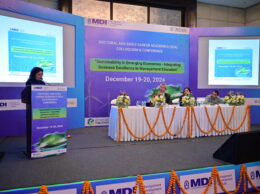Chennai, 12 November 2017: Indian Institute of Technology (IIT) Madras has released its’ Ninth Annual Report on the Indian Venture Capital and Private Equity focusing on ‘The State & the Start-Up: Analysis of government policies and support for start-ups’
The 2017 report analyses the Policy Framework and support provided to Start-ups by Central and State governments and various Governmental Agencies. The report was released at TiECON Chennai 2017, the Annual Entrepreneurship Conference of TiE Chennai yesterday (11th November 2017) in the Presence of Prof. Bhaskar Ramamurthi, Director, IIT Madras, and other dignitaries.
Some of the key findings include:
Promoting start-ups as a tool to achieve social objectives. Examples include – Modernization (Union Ministry of Textiles); Village development (Union Ministry of Rural Development); Social Empowerment and Equality (Union Ministry of Social Justice and Empowerment); Research & Development among youth (Department of Science and Technology).
Government Policies to encourage start-ups in the priority sectors: Examples include Health Technology and Clean Technology to bring in innovation and growth in these sectors. Policies also focus on sectors (like agriculture) that find it difficult to get support from VCPE (Venture Capital/Private Equity/) investors.
State Governments’ focus on start-ups has significantly increased since 2015: Out of the 29 Indian States, 22 formally came out with policies that were targeted at start-ups in the last three years. Cumulatively, the State Governments policies envisage creation of incubation space of 5.1 million square feet, 48,000 start-ups, and Investment of close to Rs. 34,000 crore of venture funding by 2022.
Start-up Programs by Public Sector Undertakings (PSU) and CSIR Labs: Since 2016, at least 10 PSUs have launched their start-up support programs. The aggregate initial outlay of all the PSUs for start-up funding is around Rs.400 crore. The Council of Scientific and Industrial Research (CSIR) expects to support, by the end of 2017, around 100 incubatees in Five CSIR laboratories.
Key features of PSU and CSIR Support: The PSUs and CSIR labs are supporting start-ups in those sectors that are either capital intensive or very niche and therefore has had very few start-ups. For the same reasons, there has been very little venture funding for sectors like oil and gas, food technology, and so on. Initial funding and incubation support from the PSUs and the CSIR labs would contribute significantly in bringing innovation through start-ups in these sectors.
Funding from Public Sector Financial Institutions (PSFIs): At least 30 PSFIs who have contributed to the corpus of VC funds. The current value of investments by PSFIs in various venture funds have been in excess of Rs. 7000 crores. The PSFIs are prepared to support ventures in those sectors that fall in the rain shadow region of traditional VC funding. Average round size of venture funds in which PSFIs have invested was $12 million and the average stake acquired was 22 per cent, implying a post-money valuation of about $50 million.
The report also features two case studies on Telangana and Kerala. It finds Telangana to be focused on attracting the best of the start-ups from across the country to be a part of the ecosystem. In Kerala, the main focus of the policy was to generate employment. Start-up hubs were spread across the state, and not just in the capital. Three major cities had significant infrastructure facilities for start-ups: Kochi, Trivandrum and Kozhikode.
IIT Madras has been publishing an annual report on the Indian Venture Capital and Private Equity industry since 2009.
“The Indian start-up landscape has also dramatically changed in the last few years. Today, India features in the top three countries globally in terms of the number of start-ups,” says Prof. Thillai Rajan, Professor, Department of Management Studies, IIT Madras and Associate at Harvard Kennedy School, Harvard University. He has been the Editor and co-author of the publication since its inception.
The policy environment and the ecosystem for start-ups have been supportive in recent years. There are at least 14 Ministries and Departments of the Central Government who have formulated policies and schemes for start-ups, adds Prof. Thillai Rajan.
Mr. Anup Bagchi, Executive Director, ICICI Bank, was the Chairman of the ten-member Editorial Advisory Review Board of this years’ report comprising distinguished members from the industry and government.
“With India becoming one of the leading hub for start-ups globally, the sector has caught the imagination of policy makers. Since 2015, there has been a dramatic increase on the policy focus on start-ups. This report analyses the government policies and public sector support programs for start-ups. It presents how the initiatives by Government complements private sector funding for start-ups,” adds Mr. Anup Bagchi.
Releasing the report, V. Shankar, President of TiE Chennai, said, “The theme for this years’ report is very timely. It is critical that entrepreneurs know the flavour of public sector support for start-ups so that they know when and how to be benefitted by them. The findings of the report would also benefit policy makers in identifying existing gaps and ways to strengthen them. TiE Chennai is privileged to continue this association with IIT Madras. We hope to continue to be associated with this annual edition every year.”
Mr. Gopal Srinivasan, Chairman of TVS Capital and Chairman of India Private Equity and Venture Capital Association, said, “The annual India Venture Capital Reports by IIT Madras have by now become a regular feature that the Indian Venture Capital & Private Equity (AIF) industry looks forward to. The analytical rigour in the findings of these reports have considerably enriched our perspectives of the undercurrents of the Indian VC/PE industry. This years’ report on government policy and support for start-ups is very timely. It highlights several unique features of public sector funding and governmental regulatory support for ventures. Very importantly, it also illustrates how start-up promotion as public policy can be truly transformative for entrepreneurs, innovation, investors and most importantly, for society as a whole.”









